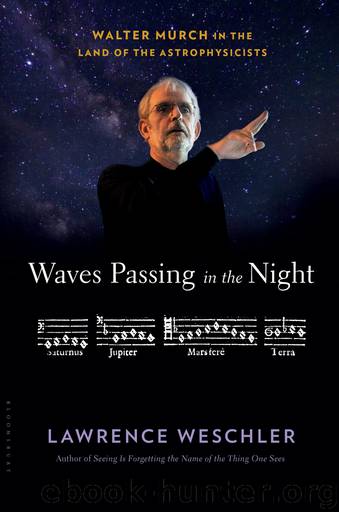Waves Passing in the Night by Lawrence Weschler

Author:Lawrence Weschler
Language: eng
Format: epub
ISBN: 9781632867209
Publisher: Bloomsbury Publishing
Published: 2017-03-21T16:00:00+00:00
Poe
Murch seemed to identify with Poe.
Other times, Murch would say, “Of course I am speaking analogically or, more accurately, in a Vaihingerian manner,” again invoking the neo-Kantian philosopher behind The Philosophy of “As-If.” “The model I am seeing in these orbital systems behaves as if there were weak standing wave undulations in the density of space-time (or at any rate standing wave undulations in something).”
“I mean,” he would sometimes elaborate, “I know I’m wrong.” That wasn’t news to him, that some of his ideas, especially with regard to causalities, weren’t quite fitting together and could easily be shot down as such. Something was missing, or perhaps needed flipping in some as-yet-inconceivable (to him or anyone else) way. But that, as Vaihinger had taught, is how science works: stumbling forward by a sequence of analogical, as-if approximations—useful “heuristic fictions.”
One night, over a meal of sushi in Manhattan, on one of Murch’s passes through the city between London and Bolinas, he offered up (by way of analogy of course) a history lesson, starting with his hero: “Kepler had only a dim idea of what made the solar system tick (he thought it was magnetism, not gravity), but he did get the idea (and he was the first to do so) that there were two opposing forces at work: the Sun was exerting some kind of force, and the planets were somehow resisting it. Everyone before him had thought there was only one force: angel power—the planets were being pushed around their tracks by divine impetus. That is what made the idea of ellipses so disturbing to everyone (including Kepler): why would angels push the planets in ellipses rather than (perfect) circles? Everyone, including him, said that was ridiculous, and he characterized it as a ‘cartload of dung’ right there in the middle of his theory. But when he at length came to terms with the elliptical nature of orbits, he put it down to the balance of forces occasioned by the way the sun sent out magnetic spokes which were fast in close but slower further out. He was wrong in that it was not magnetism, but he was right in that he saw a force welling out from the Sun that obeyed inverse square laws and a resistance at the other end. Newton would reframe the phenomenon in terms of inertia and momentum, and cross out the ‘magnetism,’ replacing it with ‘universal gravitational force.’
Download
This site does not store any files on its server. We only index and link to content provided by other sites. Please contact the content providers to delete copyright contents if any and email us, we'll remove relevant links or contents immediately.
| Actors & Entertainers | Artists, Architects & Photographers |
| Authors | Composers & Musicians |
| Dancers | Movie Directors |
| Television Performers | Theatre |
Cecilia; Or, Memoirs of an Heiress — Volume 2 by Fanny Burney(31935)
Cecilia; Or, Memoirs of an Heiress — Volume 3 by Fanny Burney(31925)
Fanny Burney by Claire Harman(26591)
We're Going to Need More Wine by Gabrielle Union(19032)
Plagued by Fire by Paul Hendrickson(17401)
All the Missing Girls by Megan Miranda(15927)
Cat's cradle by Kurt Vonnegut(15325)
Bombshells: Glamour Girls of a Lifetime by Sullivan Steve(14046)
For the Love of Europe by Rick Steves(13872)
Leonardo da Vinci by Walter Isaacson(13309)
4 3 2 1: A Novel by Paul Auster(12363)
The remains of the day by Kazuo Ishiguro(8965)
Adultolescence by Gabbie Hanna(8910)
Note to Self by Connor Franta(7663)
Diary of a Player by Brad Paisley(7552)
Giovanni's Room by James Baldwin(7316)
What Does This Button Do? by Bruce Dickinson(6194)
Ego Is the Enemy by Ryan Holiday(5411)
Born a Crime by Trevor Noah(5368)
